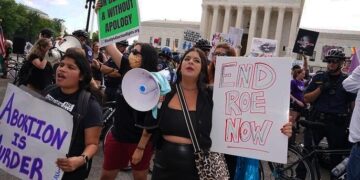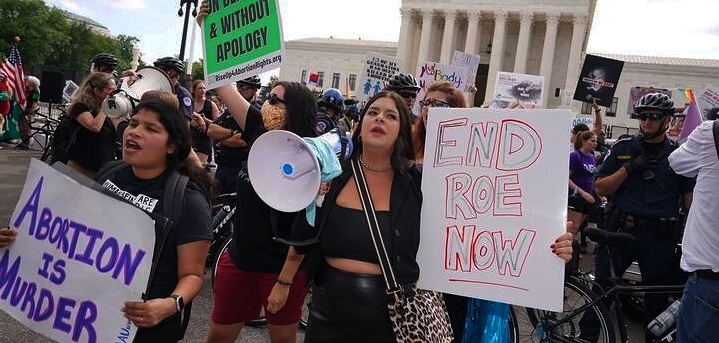By John Ikani
The Supreme court in a 5-4 decision on Friday overturned Roe v. Wade, the landmark ruling that established the constitutional right to abortion in the U.S. in 1973.
The court’s controversial but expected ruling gives individual states the power to set their own abortion laws without concern of running afoul of Roe, which had permitted abortions during the first two trimesters of pregnancy.
In the majority opinion, Justice Samuel Alito said “abortion presents a profound moral issue on which Americans hold sharply conflicting views.
“The Constitution does not prohibit the citizens of each State from regulating or prohibiting abortion,” he said.
Alito was joined in that judgment by four other conservatives on the high court. The majority also included three justices appointed by former President Donald Trump: Neil Gorsuch, Brett Kavanaugh and Amy Coney Barrett.
“We hold that Roe and Casey must be overruled,” Alito wrote.
“The Constitution makes no reference to abortion, and no such right is implicitly protected by any constitutional provision, including the one on which the defenders of Roe and Casey now chiefly rely — the Due Process Clause of the Fourteenth Amendment,” Alito wrote.
“That provision has been held to guarantee some rights that are not mentioned in the Constitution, but any such right must be ‘deeply rooted in this Nation’s history and tradition’ and ‘implicit in the concept of ordered liberty,” he added.
“It is time to heed the Constitution and return the issue of abortion to the people’s elected representatives,” Alito wrote.
In their scathing joint dissent, the court’s liberal justices wrote, “The majority has overruled Roe and Casey for one and only one reason: because it has always despised them, and now it has the votes to discard them. The majority thereby substitutes a rule by judges for the rule of law.”
“The majority would allow States to ban abortion from conception onward because it does not think forced childbirth at all implicates a woman’s rights to equality and freedom,” said the dissent by Stephen Breyer, Sonia Sotomayor and Elena Kagan.
“Today’s Court, that is, does not think there is anything of constitutional significance attached to a woman’s control of her body and the path of her life,” it said. “A State can force her to bring a pregnancy to term, even at the steepest personal and familial costs.”
Almost half the states are expected to outlaw or severely restrict abortion as a result of the Supreme Court’s decision, which is related to a highly restrictive new Mississippi abortion law. The laws will affect tens of millions of people around the country, who may have to cross state lines to seek reproductive health care.
Other states plan to maintain more liberal rules governing the termination of pregnancies.
Before the Roe decision, many states banned abortion, leaving women who wanted to terminate a pregnancy with few options. As a result of Friday’s ruling, women with unwanted pregnancies in large swathes of America may face the choice of traveling to another state where the procedure remains legal and available, buying abortion pills online or having a potentially dangerous illegal abortion.




































